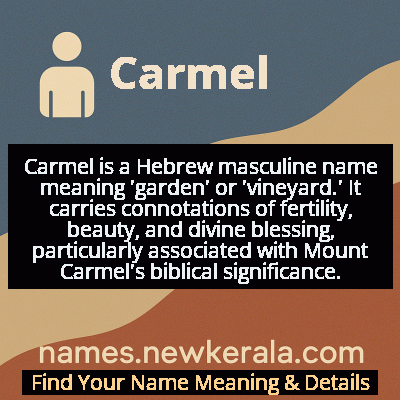Carmel Name Meaning & Details
Origin, Popularity, Numerology Analysis & Name Meaning of Carmel
Discover the origin, meaning, and cultural significance of the name CARMEL. Delve into its historical roots and explore the lasting impact it has had on communities and traditions.
Name
Carmel
Gender
Male
Origin
Hebrew
Lucky Number
7
Meaning of the Name - Carmel
Carmel is a Hebrew masculine name meaning 'garden' or 'vineyard.' It carries connotations of fertility, beauty, and divine blessing, particularly associated with Mount Carmel's biblical significance.
Carmel - Complete Numerology Analysis
Your Numerology Number
Based on Pythagorean Numerology System
Ruling Planet
Neptune (Ketu)
Positive Nature
Intuitive, analytical, spiritual, and inquisitive.
Negative Traits
Secretive, reserved, aloof, and can be overly critical.
Lucky Colours
Green, yellow.
Lucky Days
Monday.
Lucky Stones
Cat’s eye, moonstone.
Harmony Numbers
1, 5, 6.
Best Suited Professions
Scientists, researchers, spiritual leaders, detectives.
What People Like About You
Depth of knowledge, analytical skills, spirituality.
Famous People Named Carmel
Carmel Busuttil
Footballer
Maltese football legend and national team captain
Carmel Budiardjo
Human Rights Activist
Founded TAPOL, organization campaigning for human rights in Indonesia
Carmel Zollo
Politician
Australian Senator and Minister for Emergency Services
Carmel McSharry
Actor
Irish actress known for theater and television roles
Name Variations & International Equivalents
Click on blue names to explore their detailed meanings. Gray names with will be available soon.
Cultural & Historical Significance
The Carmelite religious order, founded on Mount Carmel in the 12th century, further cemented the name's spiritual associations, though the masculine usage predates Christian traditions. In modern Israel, the name maintains its connection to the land and its biblical heritage, serving as a reminder of the country's ancient roots and natural beauty. The geographical significance extends beyond religious contexts, as Mount Carmel's unique ecosystem and strategic location have made it historically important for trade, agriculture, and settlement patterns throughout the Eastern Mediterranean region.
Extended Personality Analysis
Individuals named Carmel often exhibit a grounded, nurturing nature that aligns with the name's meaning of 'garden.' They tend to be patient cultivators—whether of relationships, projects, or ideas—demonstrating a methodical approach to growth and development. Their personality frequently combines practical wisdom with a quiet strength, making them reliable anchors in both personal and professional settings. Many Carmels possess an innate connection to nature and beauty, often finding peace in outdoor spaces or creative pursuits.
They typically approach challenges with resilience and perseverance, much like a garden that weathers seasons yet continues to flourish. While they may appear reserved initially, they reveal deep loyalty and care for those they trust, embodying the protective yet life-giving qualities of a well-tended garden. Their leadership style tends to be supportive rather than authoritarian, focusing on creating environments where others can thrive. This combination of steadfastness and gentleness makes Carmels particularly effective in roles requiring both compassion and determination, from education and healthcare to community organizing and environmental work.
Modern Usage & Popularity
In contemporary usage, Carmel remains a relatively uncommon but meaningful choice for boys, particularly among families with Hebrew or Jewish heritage. While more frequently used as a feminine name in some Western countries, its masculine usage persists strongly in Israel and among Jewish communities worldwide. The name has maintained steady but low popularity rankings in English-speaking countries, often chosen for its biblical significance and natural imagery rather than trendiness. In recent decades, there's been a slight resurgence of nature-inspired names, which has brought renewed attention to Carmel. The name is particularly popular in Israel, where it ranks consistently in the top 200 male names, and among families seeking names with strong religious and cultural connections. Its usage spans various socioeconomic backgrounds and is often selected by parents valuing tradition and meaningful etymology over contemporary naming fashions.
Symbolic & Spiritual Meanings
Symbolically, Carmel represents fertility, abundance, and spiritual nourishment, drawing from its literal meaning as a garden or vineyard. It embodies the concept of cultivated beauty—both in nature and in human character—suggesting that meaningful growth requires patience, care, and favorable conditions. The name carries connotations of peace and sanctuary, evoking images of protected, fruitful spaces where life can flourish. In a metaphorical sense, Carmel symbolizes the intersection of divine blessing and human stewardship, representing the ideal balance between receiving natural gifts and actively nurturing them. It also suggests resilience, as gardens must endure changing seasons while maintaining their essential character. The mountain imagery associated with Carmel adds layers of symbolism related to spiritual ascent, perspective, and the meeting point between earthly and heavenly realms, making it a name rich with multidimensional meaning.

